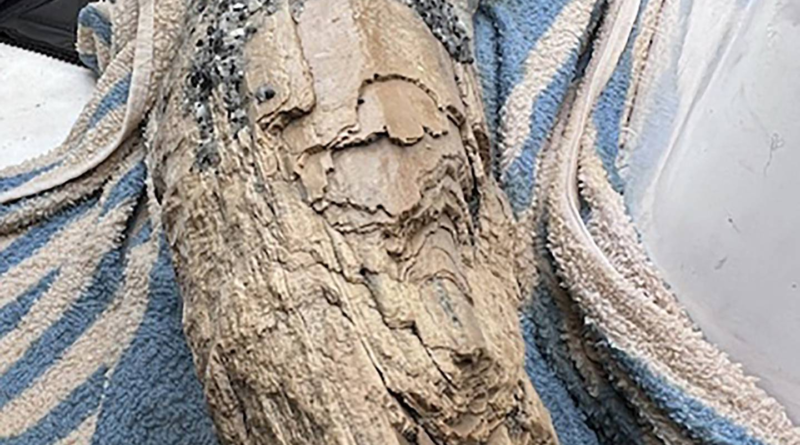Fossil-hunting diver says he has found a large section of mastodon tusk off Florida's coast – WSB Radio
Mastodon Tusk Florida This April 2024 photo taken by Blair Morrow and provided by Alex Lundberg shows a large section of tusk from a long-extinct mastodon that Lundberg and his diver companion found on the sea floor off Florida’s Gulf coast. They first thought it was just a large piece of wood. (Blair Morrow via AP) (Blair Morrow/AP)
ST. PETERSBURG, Fla. — (AP) — At first, fossil-hunting diver Alex Lundberg thought the lengthy object on the sea floor off Florida’s Gulf Coast was a piece of wood. It turned out to be something far rarer, Lundberg said: a large section of tusk from a long-extinct mastodon.
Lundberg and his diver companion had found fossils in the same place before, including mammoth teeth, bones of an ancient jaguar and parts of a dire wolf. They also have found small pieces of mastodon tusk, but nothing this big and intact.
“We kind of knew there could be one in the area,” Lundberg said in an interview, noting that as he kept fanning away sand from the tusk he found in April “it just keeps getting bigger and bigger. I’m like, this is a big tusk.”
The tusk measures about 4 feet (1.2 meters) and weighs 70 pounds (31 kilograms), Lundberg said, and was found at a depth of about 25 feet (7.6 meters) near Venice, Florida. It’s currently sitting in a glass case in his living room, but the story may not end there.
Mastodons are related to mammoths and current-day elephants. Scientists say they lived mainly in what is now North America, appearing as far back as 23 million years ago. They became extinct about 10,000 years ago, along with dozens of other large mammals that disappeared when Earth’s climate was rapidly changing — and Stone Age humans were on the hunt.
Remains of mastodons are frequently found across the continent, with Indiana legislators voting a couple years ago to designate the mastodon as its official state fossil. Mastodons are on exhibit at the La Brea Tar Pits in Los Angeles, one of the most significant locations in the world for fossils of the bygone era.
The age of the tusk Lundberg found has not yet been determined.
Under Florida law, fossils of vertebrates found on state lands, which include near-shore waters, belong to the state under authority of the Florida Museum of Natural History. Lundberg has a permit to collect such fossils and must report the tusk find to the museum when his permit is renewed in December. He’s had that permit since 2019, according to the museum.
“The museum will review the discoveries and localities to determine their significance and the permit holder can keep the fossils if the museum does not request them within 60 days of reporting,” said Rachel Narducci, collections manager at the museum’s Division of Vertebrate Paleontology. “This may be a significant find depending on exactly where it was collected.”
Lundberg, who has a marine biology degree from the University of South Florida and now works at a prominent Tampa cancer center, is optimistic he’ll be able to keep the tusk.
“You don’t know where it came from. It’s been rolling around in the ocean for millions of years. It’s more of a cool piece,” he said.
Copyright 2024 The Associated Press. All rights reserved. This material may not be published, broadcast, rewritten or redistributed without permission.
Your browser does not support HTML5 audio.
news
weather
traffic
Sign up below to be added to our mailing list for the latest news updates, access to exclusive contests, and more!
Everything you love about wsbradio.com and more! Tap on any of the buttons below to download our app.
Enable our Skill today to listen live at home on your Alexa Devices!
© Cox Media Group. All Rights Reserved. By using this website, you accept the terms of our Visitor Agreement and Privacy Policy, and understand your options regarding Ad Choices. Learn about careers at Cox Media Group.
You may be offline. Please check your connection and try again using the Retry button.




 This year in odd news: The weirdest headlines from the Houston area in 2022 – KPRC Click2Houston
This year in odd news: The weirdest headlines from the Houston area in 2022 – KPRC Click2Houston 